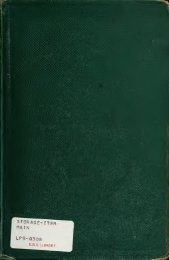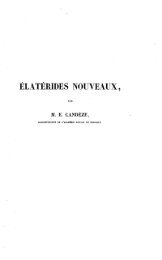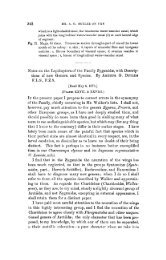- Page 5:
-.^M/ivt^'Mta^^0r'VJT.'''Jh -\ o *
- Page 8 and 9:
NATURAL SELECTION. First Edition 18
- Page 10 and 11:
PREFACEALTERATIONS IN THE SECOND ED
- Page 12 and 13:
CONTENTSof Protective Colouring Obj
- Page 14 and 15:
CONTENTSTEOPICAL NATURE AND OTHER E
- Page 16 and 17:
CONTENTSof Flowers and their Geogra
- Page 19 and 20:
ON THE LAW WHICH HAS REGULATED THE
- Page 21 and 22:
THE INTRODUCTION OF NEW SPECIESexpl
- Page 23 and 24:
THE INTRODUCTION OF NEW SPECIEScomm
- Page 25 and 26:
THE INTRODUCTION OF NEW SPECIEShave
- Page 27 and 28:
THE INTRODUCTION OF NEW SPECIESread
- Page 29 and 30:
i THE INTRODUCTION OF NEW SPECIES 1
- Page 31 and 32:
i THE INTRODUCTION OF NEW SPECIES 1
- Page 33 and 34:
i THE INTRODUCTION OF NEW SPECIES 1
- Page 35 and 36:
i THE INTRODUCTION OF NEW SPECIES 1
- Page 37 and 38:
'INTRODUCTORY NOTE TO CHAPTER II 21
- Page 39 and 40:
ii ON THE TENDENCY OF VARIETIES, ET
- Page 41 and 42:
ii ON THE TENDENCY OF VARIETIES, ET
- Page 43 and 44:
ii ON THE TENDENCY OF VARIETIES, ET
- Page 45 and 46:
ii ON THE TENDENCY OF VARIETIES, ET
- Page 47 and 48:
ii ON THE TENDENCY OF VARIETIES, ET
- Page 49 and 50:
ii ON THE TENDENCY OF VARIETIES, ET
- Page 51 and 52:
in PROTECTIVE RESEMBLANCES AMONG AN
- Page 53 and 54:
PROTECTIVE RESEMBLANCES AMONG ANIMA
- Page 55 and 56:
in PROTECTIVE RESEMBLANCES AMONG AN
- Page 57 and 58:
in PROTECTIVE RESEMBLANCES AMONG AN
- Page 59 and 60:
in PROTECTIVE RESEMBLANCES AMONG AN
- Page 61 and 62:
in PROTECTIVE RESEMBLANCES AMONG AN
- Page 63 and 64:
in PROTECTIVE RESEMBLANCES AMONG AN
- Page 65 and 66:
in PROTECTIVE RESEMBLANCES AMONG AN
- Page 67 and 68:
in PROTECTIVE EESEMBLANCES AMONG AN
- Page 69 and 70:
in PROTECTIVE RESEMBLANCES AMONG AN
- Page 71 and 72:
in PROTECTIVE RESEMBLANCES AMONG AN
- Page 73 and 74:
in PROTECTIVE RESEMBLANCES AMONG AN
- Page 75 and 76:
in PROTECTIVE RESEMBLANCES AMONG AN
- Page 77 and 78:
in PROTECTIVE RESEMBLANCES AMONG AN
- Page 79 and 80:
in PROTECTIVE RESEMBLANCES AMONG AN
- Page 81 and 82:
in PROTECTIVE RESEMBLANCES AMONG AN
- Page 83 and 84:
in PROTECTIVE RESEMBLANCES AMONG AN
- Page 85 and 86:
in PROTECTIVE RESEMBLANCES AMONG AN
- Page 87 and 88:
in PROTECTIVE RESEMBLANCES AMONG AN
- Page 89 and 90:
in PROTECTIVE RESEMBLANCES AMONG AN
- Page 91 and 92:
in PROTECTIVE RESEMBLANCES AMONG AN
- Page 93 and 94:
in PROTECTIVE RESEMBLANCES AMONG AN
- Page 95 and 96:
in PROTECTIVE RESEMBLANCES AMONG AN
- Page 97 and 98:
in PROTECTIVE RESEMBLANCES AMONG AN
- Page 99 and 100:
in PROTECTIVE RESEMBLANCES AMONG AN
- Page 101 and 102:
in PROTECTIVE RESEMBLANCES AMONG AN
- Page 103 and 104:
in PROTECTIVE RESEMBLANCES AMONG AN
- Page 105 and 106:
in PROTECTIVE RESEMBLANCES AMONG AN
- Page 107 and 108:
IVON INSTINCT INMAN AND ANIMALSTHE
- Page 109 and 110:
ON INSTINCT IN MAN AND ANIMALSconti
- Page 111 and 112:
iv ON INSTINCT IN MAN AND ANIMALS 9
- Page 113 and 114:
iv ON INSTINCT IN MAN AND ANIMALS 9
- Page 115 and 116:
THE PHILOSOPHY OF BIRDS' NESTSDo Me
- Page 117 and 118:
v THE PHILOSOPHY OF BIRDS' NESTS 10
- Page 119 and 120:
v THE PHILOSOPHY OF BIRDS' NESTS 10
- Page 121 and 122:
v THE PHILOSOPHY OF BIRDS' NESTS 10
- Page 123 and 124:
v THE PHILOSOPHY OF BIRDS' NESTS 10
- Page 125 and 126:
v THE PHILOSOPHY OF BIRDS' NESTS 10
- Page 127 and 128:
v THE PHILOSOPHY OF BIRDS' NESTS 11
- Page 129 and 130:
v THE PHILOSOPHY OF BIRDS' NESTS 11
- Page 131 and 132:
v THE PHILOSOPHY OF BIRDS' NESTS 11
- Page 133 and 134:
thev THE PHILOSOPHY OF BIRDS' NESTS
- Page 135 and 136:
vi A THEORY OF BIRDS' NESTS 119Chan
- Page 137 and 138:
vi A THEORY OF BIRDS' NESTS 121thei
- Page 139 and 140:
vi A THEORY OF BIRDS' NESTS 123whil
- Page 141 and 142:
vi A THEORY OF BIRDS' NESTS 125the
- Page 143 and 144:
'vi A THEORY OF BIRDS' NESTS 12720.
- Page 145 and 146: A THEORY OF BIRDS' NESTSnatural phe
- Page 147 and 148: vi A THEORY OF BIRDS' NESTS 131most
- Page 149 and 150: vi A THEORY OF BIRDS' NESTS 133Real
- Page 151 and 152: vi A THEORY OF BIRDS' NESTS 135form
- Page 153 and 154: vi A THEORY OF BIRDS' NESTS 137of c
- Page 155 and 156: vi A THEORY OF BIRDS' NESTS 139ence
- Page 157 and 158: VIICREATION BY LAW 1AMONG the vario
- Page 159 and 160: vii CREATION BY LAW 143the whole or
- Page 161 and 162: CREATION BY LAW 145occur to him as
- Page 163 and 164: CREATION BY LAW 147inches, and was
- Page 165 and 166: vii CREATION BY LAW 149the growth o
- Page 167 and 168: vii CREATION BY LAW 161navigable ri
- Page 169 and 170: vii CREATION BY LAW 153sifted, and
- Page 171 and 172: CREATION BY LAW 155ments of beauty
- Page 173 and 174: CREATION BY LAW 157met with. On thi
- Page 175 and 176: CREATION BY LAW 159determined at th
- Page 177 and 178: vii CREATION BY LAW 161cannot be fu
- Page 179 and 180: CREATION BY LAW 163into a gull with
- Page 181 and 182: CREATION BY LAW 165the Eocene Anopl
- Page 183 and 184: VIIITHE DEVELOPMENT OF HUMAN RACESN
- Page 185 and 186: vni THE DEVELOPMENT OF HUMAN RACES
- Page 187 and 188: vin THE DEVELOPMENT OF HUMAN RACES
- Page 189 and 190: THE DEVELOPMENT OF HUMAN RACES 173D
- Page 191 and 192: via THE DEVELOPMENT OF HUMAN RACES
- Page 193 and 194: vin THE DEVELOPMENT OF HUMAN RACES
- Page 195: viii THE DEVELOPMENT OF HUMAN RACES
- Page 199 and 200: vin THE DEVELOPMENT OF HUMAN RACES
- Page 201 and 202: vin THE DEVELOPMENT OF HUMAN RACES
- Page 203 and 204: ix LIMITS OF NATURAL SELECTION IN M
- Page 205 and 206: ix LIMITS OF NATURAL SELECTION IN M
- Page 207 and 208: ix LIMITS OF NATURAL SELECTION IN M
- Page 209 and 210: ix LIMITS OF NATURAL SELECTION IN M
- Page 211 and 212: LIMITS OF NATURAL SELECTION IN MAN
- Page 213 and 214: ix LIMITS OF NATURAL SELECTION IN M
- Page 215 and 216: ix LIMITS OF NATURAL SELECTION IN M
- Page 217 and 218: ix LIMITS OF NATURAL SELECTION IN M
- Page 219 and 220: ix LIMITS OF NATURAL SELECTION IN M
- Page 221 and 222: ix LIMITS OF NATURAL SELECTION IN M
- Page 223 and 224: ix LIMITS OF NATURAL SELECTION IN M
- Page 225 and 226: ix LIMITS OF NATURAL SELECTION IN M
- Page 227 and 228: LIMITS OF NATURAL SELECTION IN MAN
- Page 229 and 230: ix LIMITS OF NATURAL SELECTION IN M
- Page 231: TROPICAL NATURE AND OTHER ESSAYS
- Page 234 and 235: 218 TROPICAL NATUREThe Three Climat
- Page 236 and 237: TROPICAL NATURE
- Page 238 and 239: 222 TROPICAL NATUREproduces any bur
- Page 240 and 241: 224 TROPICAL NATUREof humidity, as
- Page 242 and 243: TROPICAL NATUREIn the north tempera
- Page 244 and 245: 228 TROPICAL NATUREslight fall of t
- Page 246 and 247:
TROPICAL NATUREclimate of the equat
- Page 248 and 249:
TROPICAL NATUREpermanent springs to
- Page 250 and 251:
234 TROPICAL NATUREand a beauty tha
- Page 252 and 253:
236 TROPICAL NATUREheat increased h
- Page 254 and 255:
IIEQUATORIAL VEGETATIONThe Equatori
- Page 256 and 257:
240 TROPICAL NATUREforest-belts in
- Page 258 and 259:
I242 TROPICAL NATURE nposed to thin
- Page 260 and 261:
244 TROPICAL NATUREand fillsurround
- Page 262 and 263:
246 TROPICAL NATUREmight have been
- Page 264 and 265:
248 TROPICAL NATUREBesides these va
- Page 266 and 267:
250 TROPICAL NATURE nover shrubs an
- Page 268 and 269:
252 TROPICAL NATUREoil from the coc
- Page 270 and 271:
254 TROPICAL NATUREand handsome flo
- Page 272 and 273:
256 TROPICAL NATUREof palms or of t
- Page 274 and 275:
258 TROPICAL NATUREzigzag, branched
- Page 276 and 277:
TROPICAL NATUREPalembang, in Sumatr
- Page 278 and 279:
TROPICAL NATUREcan be put to uses w
- Page 280 and 281:
264 TROPICAL NATUREperate and frigi
- Page 282 and 283:
266 TROPICAL NATUREleaves standing
- Page 284 and 285:
TROPICAL NATUREregions of polar col
- Page 286 and 287:
IllANIMAL LIFE IN THE TROPICAL FORE
- Page 288 and 289:
272 TROPICAL NATUREin books of trav
- Page 290 and 291:
TROPICAL NATUREothers long and poin
- Page 292 and 293:
276 TROPICAL NATUREsettle upon foli
- Page 294 and 295:
278 TROPICAL NATUREsome day be valu
- Page 296 and 297:
TROPICAL NATUREespecially of Zingib
- Page 298 and 299:
TROPICAL NATUREof rare butterflies
- Page 300 and 301:
TROPICAL NATUREare always accompani
- Page 302 and 303:
286 TROPICAL NATUREcutting ant in A
- Page 304 and 305:
TROPICAL NATUREwhole insect is then
- Page 306 and 307:
290 TROPICAL NATUREmost conspicuous
- Page 308 and 309:
292 TROPICAL NATUREtion of very lar
- Page 310 and 311:
294 TROPICAL NATUREinto light or de
- Page 312 and 313:
TROPICAL NATUREcurious interactions
- Page 314 and 315:
298 TROPICAL NATUREthan are exhibit
- Page 316 and 317:
TROPICAL NATUEEthologists, it will
- Page 318 and 319:
TROPICAL NATURELizardsLizards are b
- Page 320 and 321:
304 TROPICAL NATUREshine they more
- Page 322 and 323:
TROPICAL NATUREMAMMALIAMonkeysThe h
- Page 324 and 325:
TROPICAL NATUREacross the expanded
- Page 326 and 327:
310 TROPICAL NATURErather in the un
- Page 328 and 329:
IVHUMMING-BIRDSAS ILLUSTEATING THE
- Page 330 and 331:
314 TROPICAL NATUREover the lower a
- Page 332 and 333:
316 TROPICAL NATUREhumming-birds ma
- Page 334 and 335:
318 TROPICAL NATUREsweets, in all t
- Page 336 and 337:
TROPICAL NATUREDisplay of Ornaments
- Page 338 and 339:
322 TROPICAL NATUREtamed a number o
- Page 340 and 341:
TROPICAL NATUREallied species on Ch
- Page 342 and 343:
TROPICAL NATUREvariation, and with
- Page 344 and 345:
TROPICAL NATUREhalf completed.In th
- Page 346 and 347:
TROPICAL NATUREdevelopment; the for
- Page 348 and 349:
TROPICAL NATUREsoft, while the tong
- Page 350 and 351:
334 TROPICAL NATUREtubular tongue o
- Page 352 and 353:
TROPICAL NATURElittle white-eyes (Z
- Page 354 and 355:
THE COLOURS OF ANIMALS AND SEXUAL S
- Page 356 and 357:
340 TROPICAL NATUREand emotions may
- Page 358 and 359:
342 TROPICAL NATUREIt is true that
- Page 360 and 361:
344 TROPICAL NATUREprotecting them
- Page 362 and 363:
346 TROPICAL NATUREThis caterpillar
- Page 364 and 365:
348 TROPICAL NATUREweed of these tw
- Page 366 and 367:
350 TROPICAL NATUREflies, so that i
- Page 368 and 369:
352 TROPICAL NATUREThe universal av
- Page 370 and 371:
354 TROPICAL NATUREMr. Darwin's Des
- Page 372 and 373:
356 TROPICAL NATUREexternal objects
- Page 374 and 375:
358 TROPICAL NATUREand Mr. Sorby ha
- Page 376 and 377:
TROPICAL NATUREment are much more n
- Page 378 and 379:
362 TROPICAL NATUREprotective, serv
- Page 380 and 381:
TROPICAL NATUEEincreasing complexit
- Page 382 and 383:
366 TROPICAL NATUREmale to special
- Page 384 and 385:
TROPICAL NATURErunning to its burro
- Page 386 and 387:
370 TROPICAL NATUREturkey, and the
- Page 388 and 389:
372 TROPICAL NATUREghost-moth may r
- Page 390 and 391:
374 TROPICAL NATUREwhite companions
- Page 392 and 393:
376 TROPICAL NATUREtion, and what m
- Page 394 and 395:
378 TROPICAL NATURENatural Selectio
- Page 396 and 397:
TROPICAL NATUREaway with the rapidi
- Page 398 and 399:
382 TROPICAL NATUREhere, not only i
- Page 400 and 401:
384 TROPICAL NATUREyet, as none of
- Page 402 and 403:
386 TROPICAL NATURE vmetallic colou
- Page 404 and 405:
388 TROPICAL NATUREThe Andaman isla
- Page 406 and 407:
390 TROPICAL NATUREpum, while black
- Page 408 and 409:
TROPICAL NATUREthe large brilliantl
- Page 410 and 411:
394 TROPICAL NATUREzones ;while, es
- Page 412 and 413:
396 TROPICAL NATUREthese differ gre
- Page 414 and 415:
398 TROPICAL NATUREvery minute and
- Page 416 and 417:
400 TROPICAL NATUREsmall brown seed
- Page 418 and 419:
TROPICAL NATUREdetails of these ada
- Page 420 and 421:
404 TROPICAL NATUREby butterflies.
- Page 422 and 423:
406 TROPICAL NATUREThe seeds of a p
- Page 424 and 425:
TROPICAL NATUREpurple or blue, thre
- Page 426 and 427:
410 TROPICAL NATUREON THE ORIGINOF
- Page 428 and 429:
412 TROPICAL NATUREthese were the o
- Page 430 and 431:
414 TROPICAL NATUREHomer's time he
- Page 432 and 433:
VIIIndications of Man's Extreme Ant
- Page 434 and 435:
418 TROPICAL NATUREnorth in Norway.
- Page 436 and 437:
420 TROPICAL NATUREprotoplasm up to
- Page 438 and 439:
422 TROPICAL NATUREtogether, indica
- Page 440 and 441:
424 TROPICAL NATUREto distinct and
- Page 442 and 443:
426 TROPICAL NATUREing three miles
- Page 444 and 445:
TROPICAL NATUREprominence.Other exa
- Page 446 and 447:
430 . TROPICAL NATURETheThere is on
- Page 448 and 449:
432 TROPICAL NATUREadvance, man's i
- Page 450 and 451:
434 TROPICAL NATUREdoubt, accusatio
- Page 452 and 453:
TROPICAL NATUREhave evidence of an
- Page 454 and 455:
438 TROPICAL NATUREMan Coeval with
- Page 456 and 457:
440 TROPICAL NATUREthan twenty feet
- Page 458 and 459:
442 TROPICAL NATUREare made of a cu
- Page 460 and 461:
444 TROPICAL NATUREsurrounding plai
- Page 462 and 463:
446 TROPICAL NATUREmortars have bee
- Page 464 and 465:
448 TROPICAL NATUREcoveries should
- Page 466 and 467:
IXTHE DEBT OF SCIENCE TO DARWIN 1Th
- Page 468 and 469:
452 TROPICAL NATUREanatomy could be
- Page 470 and 471:
454 TROPICAL NATUREthat each specie
- Page 472 and 473:
456 TROPICAL NATUREof comparing the
- Page 474 and 475:
458 TROPICAL NATUREHe also saw, at
- Page 476 and 477:
460 TROPICAL NATUREbotanists, farme
- Page 478 and 479:
462 TROPICAL NATUREshapes of the pr
- Page 480 and 481:
464 TROPICAL NATUREway caused the p
- Page 482 and 483:
466 TROPICAL NATUREmade showing tha
- Page 484 and 485:
468 TROPICAL NATUREour gardens, sho
- Page 486 and 487:
470 TROPICAL NATUREearth thus attac
- Page 488 and 489:
472 TROPICAL NATUREDarwin had colle
- Page 490 and 491:
474 TROPICAL NATUREendeavoured, how
- Page 492 and 493:
INDEXABBOTT, C. C., on American pal
- Page 494 and 495:
478 INDEXBelt, Mr., on leaf-cutting
- Page 496 and 497:
INDEXColour of flowers, as explaine
- Page 498 and 499:
INDEXEquatorial climate, uniformity
- Page 500 and 501:
484 INDEXHeliconidae, not attacked
- Page 502 and 503:
486 INDEX.Man, importance of mental
- Page 504 and 505:
488 INDEXOxyrhopus petolarius, 0. t
- Page 506 and 507:
isexes,490 INDEXShell-mounds, ancie
- Page 508:
115472492 INDEXWeale, Mr. J. P. Man












